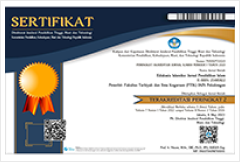Islamic Religious Education through Habituation of Religious of Indonesian Muslim Children in Korea, Before and During the Covid-19 Pandemic
DOI:
https://doi.org/10.28918/jei.v7i2.6055Keywords:
habituation of Islamic teachings, Muslim children, Islam in Korea, Education and Covid-19Abstract
he Covid-19 pandemic has had a big impact on various fields of life, including terms habituation of religious teachings to Islamic children in minority areas. In this article, we discuss the comparison of the habituation of religious teachings in Muslim children who came from Indonesia and lived in Korea before and during the Covid-19 pandemic. The research was conducted using qualitative methods in the context of studying religious education and society. The research subjects are Indonesian Muslim families in Korea who have school-age children and attend Korean public schools. The object of research is about religious habituation towards religion before and during the Covid-19 pandemic, namely in the 2020-2021 timeframe. The results showed that there was an increase in the quantity and quality of habituation of religious teachings in Muslim children from Indonesia living in Korea. The increase was obtained from a comparison before and when the Covid-19 pandemic took place. This is due to school policies at home, social distancing, and a ban on feeding in schools during the Covid-19 pandemic.
References
United-Nations. (2022). Department of Economic and Social Affairs . Retrieved from United Nations: https://www.un.org/development/desa/dspd/everyone-included-covid-19.html
Lorea, C. E. (2022, April 23). Religion and the COVID-19 pandemic: mediating presence and distance. Religion, 52(2), 177-198.
Embassy-of-the-Republic-Indonesia-in-Seoul. (2022). Country Profile and Bilateral Relationship. Retrieved from Embassy of the Republic Indonesia in Seoul, Republic of Korea: https://kemlu.go.id/seoul/en/pages/hubungan_bilateral/558/etc-menu
Kim, J., Lee, Y., & Smith, T. W. (2009, December 3). Trends of Religious Identification in Korea: Changes and Continuities. Journal for the Scientific Study of Religion, 48(4), 789-793.
Ministry-of-Culture-Sports-and-Tourism-and-Korean-Culture-and-Information-Service. (2015). Korean Life. Retrieved from Korea.net: https://www.korea.net/AboutKorea/Korean-Life/Religion
Seo, H.-A., & Clement, P. (2015, January 8). Teachers’ Views on Evolution: Religion Matters in South Korea. Procedia-Social and Behavioral Sciences, 167, 96-102.
Ahsanulkhaq, M. (2019, June 31). Membentuk Karakter Religius Peserta Didik Melalui Metode Pembiasaan. Jurnal Prakarsa Paedagogia, 2(1), 21-33.
Kerr, J. (2011). Habituation: A Method for Cultivating Starting Points in the Ethical Life. Journal of Philosophy of Education, 45(4), 644-655.
Attaran, M. (2015). Moral Education, Habituation, and Divine Assistance in View of Ghazali. Journal of Research on Christian Education, 24, 43-51.
Lisnawati, S. (2016). The Habituation of Behavior as Students’ Character Reinforcement in Global Era. Jurnal Pendidikan Islam, 2(3), 413-428.
Ladyanna, S., & Aslinda, A. (2021). Problems and Challenges of Online Lectures in Indonesia During the Pandemic COVID-19. Proceedings of the 3rd International Conference on Educational Development and Quality Assurance (ICED-QA 2020) (pp. 78-82). Dordrecht, The Netherlands: Atlantis Press.
Dzulfikar, M. I., & Amrullah, M. (2021). The Effect of the COVID-19 Pandemic on Discipline Character Habituation in Students at SD Muhammadiyah 1 Sidoarjo. Psychology and Education Conference Facing the era of Merdeka Belajar, 10.
KICE. (2022, June 20). NCIC. Retrieved from National Curriculum of Korea Source Inventory: ncic.re.kr/english.kri.org.inventoryList.do
Fathil, F., & Fathil, F. (2011). Islam in Minority Muslim Countries; A Ca se Study on Japan and Korea. World Journal of Islamic Histpry and Civilization, 1(2), 130-141.
Young-Eun, L., Il-Sun, Y., Jin-A, C., In-Sook, C., & Hye-Sung, K. (2002). School Food Service in Korea: Investigation of the Operation and Management Systems. Korean Journal of Community Nutrition, 361-372.
Muradi, A., Jailani, M. S., HS, S., Wekke, I. S., & Noor, H. (2021). Revitalization of Education for Children in Indonesian Families During the Covid-19 Pandemic. Ilkogretim Online-Elementary Education Online, 20(3), 481-490.
Nadjmuddin, H. A., & Aprilianty, L. (2020). The Analysis of Learning Strategies for Character Development of Students During Covid-19 Pandemic. Jurnaltatsqif Jurnal Pemikiran dan Penelitian Pendidikan, 18(2), 136-151.
Islammy, M. R., Komariah, K. S., Kurniani, E., Yusfiana, F. M., & Marwah, S. (2022). Improving Student Polite Character in Online Learning in the Covid-19 Pandemic Period. Bulletin of Science Education, 2(1), 41-51






















